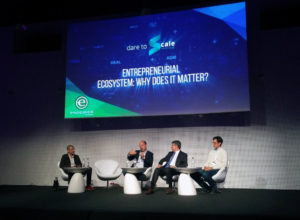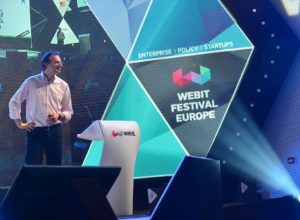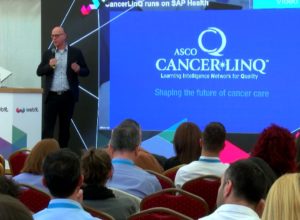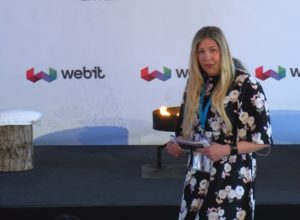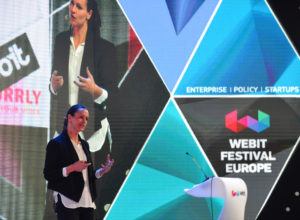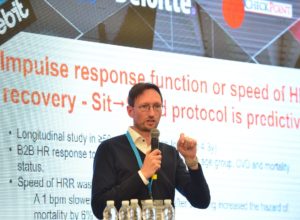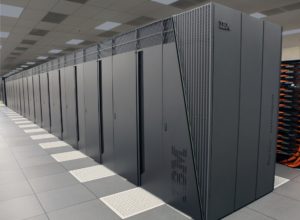Entrepreneurial Ecosystem: Why does it matter?
At Endeavour's Dare to Scale Rosen Plevneliev - the president of Bulgaria 2012-2017, Fernando Fabre - president of Enveavor Global, Vassil Terziev - Co-founder of Telerik Acacdemy had a panel discussion about the value about Entrepreneurial Ecosystem, moderated by Plamen Russev - Chairman of WEBIT Foundation.
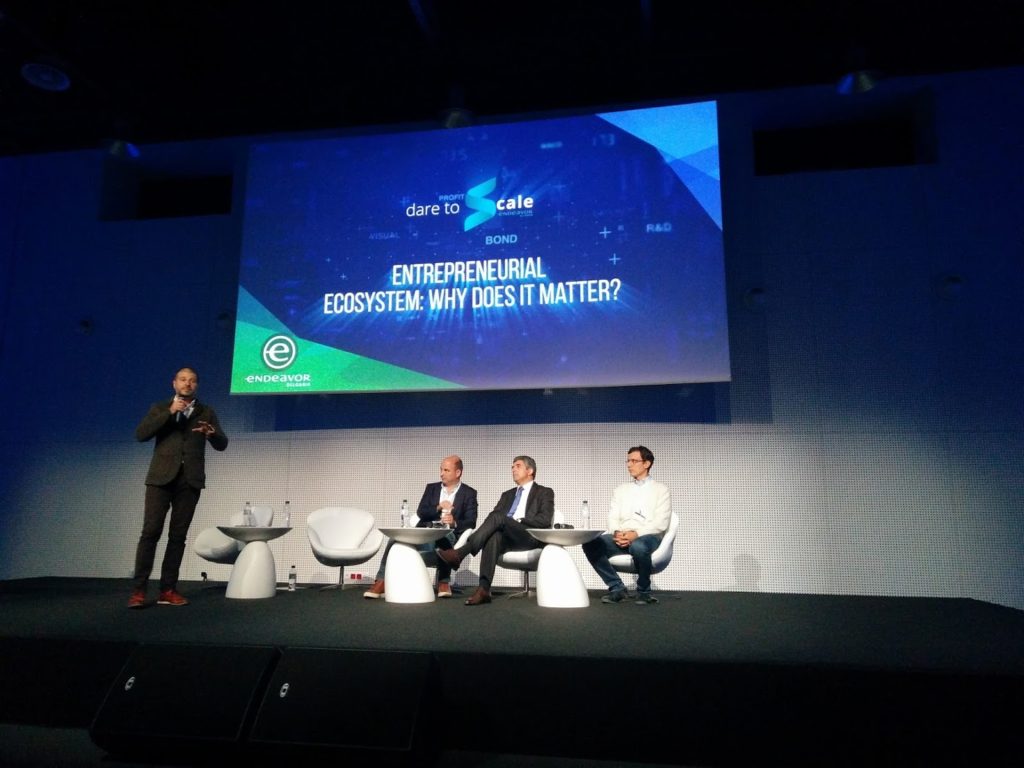 Webit Foundation commits its annual funds to foster the development of the startup and innovation ecosystems in the regions our global events take place.
Founders Games is the startup competition in the program of Webit.Festival Europe. During the event we not only provide free grant for startups to get a free expo table, free festival tickets and opportunity to meet unparalleled selection top enterprise leaders from all around the world + investors, but also an opportunity to WIN €200 000 seed investment!
Find out more about the Founder games here.
Webit Foundation commits its annual funds to foster the development of the startup and innovation ecosystems in the regions our global events take place.
Founders Games is the startup competition in the program of Webit.Festival Europe. During the event we not only provide free grant for startups to get a free expo table, free festival tickets and opportunity to meet unparalleled selection top enterprise leaders from all around the world + investors, but also an opportunity to WIN €200 000 seed investment!
Find out more about the Founder games here.
Strengths to focus on and weaknesses to work on
The discussion went through 3 stages - Bulgaria, Region and Global. Vassil Terziev took over the first stage going through the last 10 years of developing an entrepreneurial spirit in Bulgaria and bringing all the components of a working Ecosystem together. They include people, events which gather several thousand people together talking about the future. New and new formats are coming to Bulgaria every year. "The growth is a function not only of time, but also of communication and aligning the economic interests. In order something to be sustainable it has to make sense for everybody involved. And this is what is still missing." - mr. Terziev said, but staying still optimistic about what the Technology Ecosystem that's being built can do for the other sectors in Bulgaria.It's a kind of magic
"I believe in magic big time. We need the magic of giving back." mr. Plamen Russev We already have the Ecosystem startups and they are growing but do we need to focus on scale ups more? "They will make Bulgaria a better place, Through WEBIT, through Enveavor and other formats we will build those scale ups who will give back to the community." We need an ecosystem where every single person grows within the idea that he or she has to give back to the community – like the Israerli ecosystem. “You can’t say “I’ve done enough, now it’s time to give back” – no, you give back all the time. ”The Local Heroes
Mr. Rosen Plevneliev talked about the ambition of Bulgaria and how he shared his thoughts with several entrepreneurs in the Silicon Valley. “You are as big as your dreams are, not as big as your territory is. And to be globally strong, we need to be locally strong. This is what you, the local heroes are doing right now.”A map of ecosystems
Mr. Fernando Fabre took the audience on a world tour of the Ecosystems – from Buenos Aires, Mexico City, Silicon Valley, New York to Tel Aviv, Beirut and so on. He shared his opinion that it all goes down to inspiration. Big entrepreneurs inspire others – they grow and do the same – thus multiplying the mindset. “You call it giving back, Local heroes, I call it multiplying effect these are three terms that are exactly the same.” Webit Foundation commits its annual funds to foster the development of the startup and innovation ecosystems in the regions our global events take place.
Founders Games is the startup competition in the program of Webit.Festival Europe. During the event we not only provide free grant for startups to get a free expo table, free festival tickets and opportunity to meet unparalleled selection top enterprise leaders from all around the world + investors, but also an opportunity to WIN €200 000 seed investment!
Find out more about the Founder games here.
Webit Foundation commits its annual funds to foster the development of the startup and innovation ecosystems in the regions our global events take place.
Founders Games is the startup competition in the program of Webit.Festival Europe. During the event we not only provide free grant for startups to get a free expo table, free festival tickets and opportunity to meet unparalleled selection top enterprise leaders from all around the world + investors, but also an opportunity to WIN €200 000 seed investment!
Find out more about the Founder games here. How to market and sell when the act of purchase disappears
The act of purchase as we know it is progressively disappearing. Driving forces of it are the usual forces standing behind each global change happening: growing and aging population, higher standard of living, climate changes and scarce resources. Nowadays, we can also add the growing presence of digital in everyday’s life and the ever changing consumer behavior.
The VP Digital Transformation of SCA Gael de Talhouet gave quite an insightful keynote at Webit. Festival 2017 in Sofia concerning the change in the customer of tomorrow.
How do you sell products in a world where no one buys anything anymore? We’re moving from a world where we click, purchase, pay and collect to a world where we will just need to ask, because robots will know our needs.
More and more companies are introducing their subscriptions models, allowing us to get the things we want directly delivered to our homes without the need of going physically to get them from the shop. Amazon has developed the dash buttons which after being connected to your smartphone and pressed, the product you’ve chosen is automatically reordered. You don’t need to order, you just receive. Or speak, as in the case with Amazon Echo. Just ask, tell the device what you need, and it will find it for you.
The next step is when you don’t even need to speak. Fridges indicating the products that are missing from it, making lists of what needs to be purchased, washing machines and printers automatically ordering physical goods when supplies are running low. Smart devices noticing when you have a dinner with the friend who loves pizza or if you’re in need of a specific vitamins, asking to make an order for you. Or suggesting you a herbal detox tea after noticing you’ve woken up early and had a week full of meetings. It’s not rocket science, it’s history browsing and predictive analytics
And what if these devices can recognise our emotions? Scientists and are relentlessly working on and getting closer to breakthrough in the face of voice assistants.
The future of shopping is no shopping. People will not buy anymore because robots will buy. That brings the next question, how do you sell to a robot? Who will the robot buy from and how will it make the choice? Marketing strategies used to be consumer centric, while when this becomes a basis, companies will need to figure out is how to convince a robot to become their client. After digital marketing and e-commerce, welcome to robotic marketing and e-commerce.
You can watch the keynote of Gael here:
https://www.youtube.com/watch?v=SsT8LuHVg8s
Webit.Festival 2018 will gather again top speakers, policy makers and enterprise leaders. Stay up to date with our upcoming guests and agenda on our website and learn more about our ticket options.
Feel the Webit vibe with some of the best photos from this year’s event!
[easingslider id="4954"]
Cyber criminals – living like celebrities!? Their money is not from...
Raj Samani is the Chief Scientist of McAfee. He is an active member of the Information Security industry, through involvement with numerous initiatives to improve the awareness and application of security in business and society. He was inducted into the Infosecurity Europe Hall of Fame in 2012.
At Webit.Festival Europe’17 he was talking about cyber criminals, who are having a pretty good life, living like celebrities, but their money is not from hard work, this is stolen money! He wants us to know what are we up against - a brutal individuals, who have more money than we do and they are investing and growing every minute. Some of the targets of cyber criminals are hospitals - for example, in the UK they attacked a hospital via email and the result was that every emergency patient was no longer treated! These crimes don’t affect random individuals, they affect the whole world. The most disturbing thing is that ransomware could be done by
11-year-old children. It is simple like that! Nowadays children have online access to guns, drugs and could run campaigns, which is very worrisome on so many levels.
Today with ransomware you have 3 ways - neutral data, paid criminals and now you can have your data back. Raj said that until July they have provided 10,000 successful decryptions free of charge - that’s 4 million US dollars, who haven’t gone to the criminals and people got their data back.
You can watch his presentation
[youtube https://www.youtube.com/watch?v=Ts1FttnxQEI]
Webit.Festival Europe 2018 will gather again top speakers, policy makers and enterprise leaders
Visit our website and book our Super Earlybird tickets.
Feel the Webit vibe with some of the best photos from this year’s event!
[easingslider id="4954"]
Healthcare at its Gutenberg moment
“The main and huge problem in healthcare is data. Big data and big amounts of it. You can’t start creating huge clinical data warehouses anymore. The amount of data is simply exploding.”In case you’re wondering who Gutenberg is, he is the guy who invented the printing press and thus changed everything back in the times by starting the Printing Revolution. Now healthcare is at the doorstep of a suchlike event. Dr. Clemens Suter-Crazzolara, VP of Product Management for Health & Precision Medicine at SAP gave a keynote at Webit.Festival in Sofia about what are people and companies already doing with the help of technology in order to improve patients’ and doctors’ health experience and the treatment of patients. The main and huge problem in healthcare is data. Big data, and big amounts of it. If we walk in any given hospital, we inevitably notice that lots of the data we provide or data already collected, is taken on notes, sheets or some format of paper. Other industries are moving to digitalization with rocket speed but in healthcare it is not happening and this process is still somehow a struggle. Privacy, security and access to the correct data are all difficulties underlying ahead of healthcare in its process of adapting to digitalization. You can’t start creating huge clinical data warehouses anymore. The amount of data is simply exploding. You have to think of intelligent ways that the data stays in different locations, but for instance, you can send federated queries to those locations and then collect the needed answers. The use of mobile devices increases with each passing day. There are many apps which people use for consulting on their physical health, consulting with a physician online or simply googling their symptoms but the patient engagement is not fully tailored to both the patient and the physician. The need of a common platform that collects the experience and practices from physicians all around the world, as well as helping to collaborate and get information from one another and facilitating their day to day work is at the roots of change in the health system and that’s the thing SAP is trying to create. You can watch the keynote of Dr. Clemens Suter-Crazzolara here. https://www.youtube.com/watch?v=AwyLgKvCaBQ Physical and mental health, personal care and wellbeing are an ever growing theme in today’s everyday life. Recognizing it as an integrant area of value and interest, the Health & Wellbeing Summit at Webit.Festival Sofia 2018 will gather again top speakers from the industry, unveiling top tendencies and knowledge from their practice. Have a glance at last year’s Webit with some of our best photos and check our different ticket options here. [easingslider id="4954"]
Mobile first was yesterday. Today AI is first
“No matter if your business is in retail, bio, health or digital, if you want to stay relevant, focus on AI shouldn't be between the lines and done sluggishly but a top priority.” - Hristo Hristov, CEO of NetinfoHristo Hristov, CEO of Netinfo and IAB Bulgaria Chairman was one of the speakers at the Innovation Summit at Webit.Festival 2017. The company Netinfo is playing a major role in shaping the digital advertising landscape in the country and as such it has been a prominent spectator and actor in the digital trends and shifts locally and worldwide. Making the statement that mobile first is in the past and not a part of the future, Hristov made a point by initially giving a little test to the audience at Webit's stage. He asked for a raised hand from everybody who has done a marketing campaign or developed products for mobile. Result was basically 80% of the audience of around 1500 in the hall. Artificial Intelligence on the hunt Mobile now is the standard, the future is in artificial intelligence, calls Hristov from the stage. Most companies now think mobile only, and if they want to stay competitive, grow and acquire new customers on a new level, they need to start thinking AI first if haven’t yet. Having a great mobile app, having a great landing page, doing an incredible marketing campaign are all essentials for a successful business but becoming quite not enough. Not to mention digitalization, communications and tendencies but every tech-related thing is changing and evolving with a hard to grasp tempo.
Beforehand, we were the “hunters” who used to find a niche and go after it, hire the best talents who will build the best products and marketing campaigns. whereas now, we are the ones being hunted. By AI.Going a little back in time, Hristov recounted the story of a startup company - DeepMind technologies which got acquired by Google in 2014. They develop learning algorithms that use data or raw experience to better themselves and have created an engine which plays a certain game thousands of times better that any human being. In the beginning, the playing engine was losing every single round time after time. Things changed when the AI engine played the game for a hundred time, started getting better and better after each loss and reached a point of playing the best case optimal scenario for winning the game. Some would say that AI has a long way ahead of it until it reaches and affects each business but the development of AI is similar to the one of the game engine.
We see the progress of AI as a linear development but in reality, at some point AI will start growing exponentially, getting better after each downturn until reaching its full potential.AI systems are determining what results we get from our search, the order of their ranking and appearance, at which moment we will get a specific advertisement. It improves facial recognition and securing systems and privacy. AI systems are developed that spot Alzheimer’s brain changes years before symptoms emerge, writing music and novels. And it’s not stopping just yet. Stay on the tide: AI against trolls Fake news and internet trolls are not an unfamiliar problem of today's digital space. Writers and news providers have bumped with the negative side of people from all parts of the world having the comfort of a “behind the screen” freedom. In a responсе to that, a tool has been developed which can rank the toxicness of the comments in blogs, news sites and pages on the vast space of Internet. API.com is an open source platform that can be added to content sites, landing pages, forums and whatever type of sites which ranks actual online conversations and determines the percentage of toxicity in them. Afterwards, the process of extracting users marked as top toxic is smoothed and done harmlessly with a minimum damage.
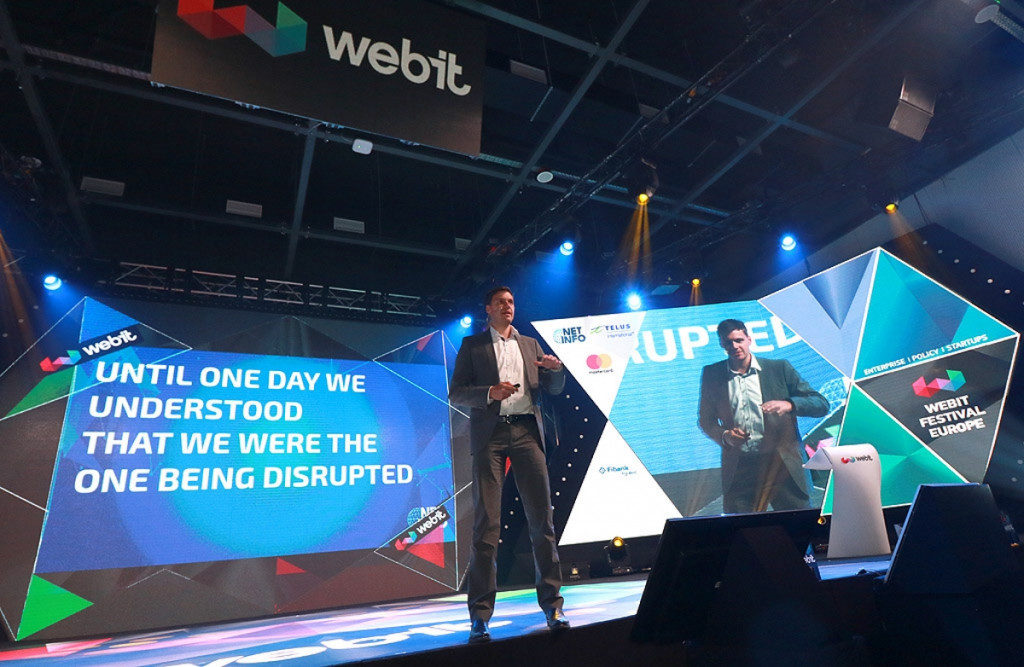 No matter if you're business is in retail, bio, health or digital, if you want to stay relevant, focus on AI shouldn't be between the lines and done sluggishly but a top priority. The best developers, data scientists, engineers and logical thinkers are literally being hunted by the biggest players so that they can respond to the fast-changing environment. Not only that, but the level of advancement in this field has piled up a lot of open source tools and frameworks that can be freely used. Interesting enough, the biggest companies with the highest advancement in AI are the ones who are open sourcing these kinds of projects.
AI investments have set its all-time highest point. Elon Musk has already launched Neuralink, a company that develops implantable brain-computer interfaces in order to connect brains with computers, the CEOs of eBay, Amazon, Google all say that not having an AI strategy will get companies out of business in ten years. The consumer journey and experience right now is not the greatest and AI is a way to make it better. Despite all the unknowns the artificial intelligence technology comprises, the benefits and chances ahead of it are immense and yet to be explored. More companies are gradually realizing this and working hard in adapting their strategy.
You can watch the full keynote of Hristo Hristov here:
[youtube https://www.youtube.com/watch?v=vQb59NdnI3k]
If you want to keep up with the latest trends in the world of digital economy and technology, then Webit.Festival is the place for you. Visit our website and book 2 in 1 of our Super Earlybird tickets for Webit.Festival Europe 2018. Have a peek at Webit.Festival 2017 in Sofia with some of our photos from the event.
[easingslider id="4954"]
No matter if you're business is in retail, bio, health or digital, if you want to stay relevant, focus on AI shouldn't be between the lines and done sluggishly but a top priority. The best developers, data scientists, engineers and logical thinkers are literally being hunted by the biggest players so that they can respond to the fast-changing environment. Not only that, but the level of advancement in this field has piled up a lot of open source tools and frameworks that can be freely used. Interesting enough, the biggest companies with the highest advancement in AI are the ones who are open sourcing these kinds of projects.
AI investments have set its all-time highest point. Elon Musk has already launched Neuralink, a company that develops implantable brain-computer interfaces in order to connect brains with computers, the CEOs of eBay, Amazon, Google all say that not having an AI strategy will get companies out of business in ten years. The consumer journey and experience right now is not the greatest and AI is a way to make it better. Despite all the unknowns the artificial intelligence technology comprises, the benefits and chances ahead of it are immense and yet to be explored. More companies are gradually realizing this and working hard in adapting their strategy.
You can watch the full keynote of Hristo Hristov here:
[youtube https://www.youtube.com/watch?v=vQb59NdnI3k]
If you want to keep up with the latest trends in the world of digital economy and technology, then Webit.Festival is the place for you. Visit our website and book 2 in 1 of our Super Earlybird tickets for Webit.Festival Europe 2018. Have a peek at Webit.Festival 2017 in Sofia with some of our photos from the event.
[easingslider id="4954"] We deserve to fight for freedom in Internet
Internet freedom differs from country to country which together with the constantly changing online landscape makes it quite hard to say whether Internet freedom is an existing phenomenon at the moment. People are social beings, we talk to each other, exchange information and emotion and this is what makes us human. The fast and easy access to information and the social interaction online has opened a door for Internet in our lives.
At Webit.Festival Europe the Chief Digital Officer of AnchorFree Inc. Baglan Rhymes talked about the importance of Internet freedom. AnchorFree focuses on this topic because it aims to provide secure and anonymous access to information on the Internet to every single person on the planet. In reality, we take the online information and bring it into our physical world. This has an impact on who we are, our preferences, philosophies and the society we live in.
In the world of today, the Internet is becoming less free. Many governments use it to take down content they don’t approve of or to launch cyber attacks against their critics or other governments. Censorship has taken control over free speech. It is important to understand the difference between the methods of suppression and those of censorship. Suppression of free speech doesn’t have to take sophisticated forms of technology. Most often it has a political or a legal aspect and it requires vigilance which governments and the police have.
[caption id="attachment_5183" align="aligncenter" width="640"]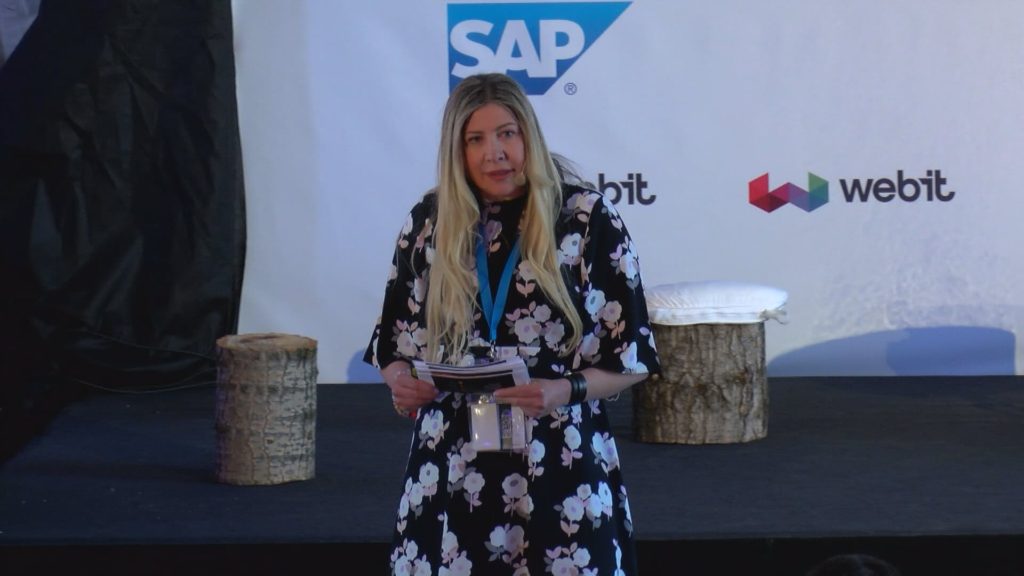 The Chief Digital Officer of AnchorFree Inc. Baglan Rhymes[/caption]
Censorship, on the other hand, takes a lot of technological forms. Such a complex and constantly evolving system as the Internet can be adapted for propaganda and manipulation. Social media in many countries is a very politicized and polarized tool which if used correctly can send a convincing but also a leading message. The media diversity shrinks and this results in many people turning into alternative sources of information. According to Baglan Rhymes:
The Chief Digital Officer of AnchorFree Inc. Baglan Rhymes[/caption]
Censorship, on the other hand, takes a lot of technological forms. Such a complex and constantly evolving system as the Internet can be adapted for propaganda and manipulation. Social media in many countries is a very politicized and polarized tool which if used correctly can send a convincing but also a leading message. The media diversity shrinks and this results in many people turning into alternative sources of information. According to Baglan Rhymes:
 The Chief Digital Officer of AnchorFree Inc. Baglan Rhymes[/caption]
Censorship, on the other hand, takes a lot of technological forms. Such a complex and constantly evolving system as the Internet can be adapted for propaganda and manipulation. Social media in many countries is a very politicized and polarized tool which if used correctly can send a convincing but also a leading message. The media diversity shrinks and this results in many people turning into alternative sources of information. According to Baglan Rhymes:
The Chief Digital Officer of AnchorFree Inc. Baglan Rhymes[/caption]
Censorship, on the other hand, takes a lot of technological forms. Such a complex and constantly evolving system as the Internet can be adapted for propaganda and manipulation. Social media in many countries is a very politicized and polarized tool which if used correctly can send a convincing but also a leading message. The media diversity shrinks and this results in many people turning into alternative sources of information. According to Baglan Rhymes:
“Social media has been spectacular in busting censorship and creating a challenge in the social sphere.”In the United States this role of social media has an impact on economy and trade. The country is most successful when the packaging and the messaging of the goods sold overseas, not the government propaganda or the military force, export the values of freedom and creativity. In reality, some of America’s best products exported abroad are in the form of downloading an application, accessing a website, streaming a movie or listening to music. People don’t have access to the culture and the values of America if their freedom on the Internet is restricted. Important companies as Apple, Alphabet, Microsoft, Amazon and Facebook export many of their products via the Internet and this is the only way they can reach consumers. Therefore, Internet freedom should be a priority for the US policy. Research shows that now there are 2.5 billion smartphones and 5 billion feature phones. It is expected that in a couple of years these feature phones will come online. The digital weapons in our hands in the face of social media, blogs and Wiki will make the way people access information and consume it a matter of life and death. The Internet is powerful enough to influence a change in any government regardless of it being democratic or not. It is our responsibility to respect that power and not to take the Internet freedom for granted. As Baglan Rhymes said:
“Make no mistake - if we lose the fight in Internet freedom we have lost the battle in maintaining our humanity and promoting democracy in the world.”You can watch her full lecture here: If you want to keep up with the latest trends in the world of digital economy and technology, then Webit.Festival is the right place for you. Visit our website and book 2 in 1 of our Super Earlybird tickets for Webit.Festival Europe 2018. Feel the Webit vibe with some of the best photos from this year’s event! [easingslider id="4954"]
Technology and its positive role in education now and in the...
Nowadays, technology is everywhere and it has a pretty extraordinary impact on our life. According to research, the average person checks their phone approximately two million times a year. Teens spend around nine hours a day consuming media. The numbers show technology is a necessity but what we get out of it depends on how we decide to use it and for what purpose.
During the 2017 edition of Webit.Festival Europe the CEO of Wurrly Nadine Levitt talked about the role of technology in education and the positive impact it can have on the current education system. Children should be able to learn skills at school which they can use later on in their life. And this is exactly what the education platform WURRLYedu stands for.
It is true that technology comes with its risks. Constantly checking our smartphones and the likes on the latest post on social media turns into a powerful addiction which fosters an unhealthy externally focused sense of value. Unfortunately, due to the anonymity it provides, technology could be used as a weapon by bullies who are much stronger when hiding behind a screen. Text messages, emails, social media - they all nurture shallow relationships by lacking an emotional contact which is the essence of face-to-face communication.
[caption id="attachment_5179" align="aligncenter" width="640"]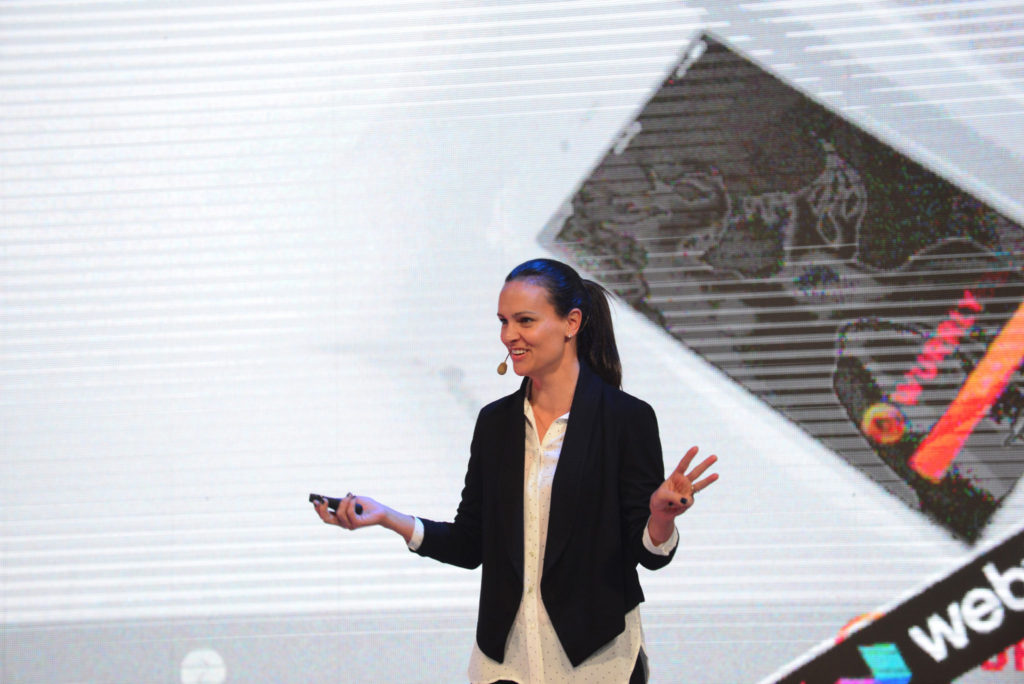 The CEO of Wurrly Nadine Levitt[/caption]
According to Nadine Levitt, the benefits of technology do outweigh the risks. The free access to vast amount of information empowers people and gives them the responsibility to be aware of what is happening around them. Mapping and forecasting save both time and money and make everyday life easier. Thanks to technology we can connect with friends and family around the globe and develop a stronger relationship with them. Through Augmented and Virtual Reality we experience places and worlds far from our current location. VR is very powerful - it can give sick children a chance to leave the hospital room and explore, play and have fun.
During her lecture, Nadine Levitt emphasized the importance of the skills she as a parent wants her children to learn at school. Education and technology should provide kids with opportunities to develop communication, collaboration, analytical and problem-solving skills.
The CEO of Wurrly Nadine Levitt[/caption]
According to Nadine Levitt, the benefits of technology do outweigh the risks. The free access to vast amount of information empowers people and gives them the responsibility to be aware of what is happening around them. Mapping and forecasting save both time and money and make everyday life easier. Thanks to technology we can connect with friends and family around the globe and develop a stronger relationship with them. Through Augmented and Virtual Reality we experience places and worlds far from our current location. VR is very powerful - it can give sick children a chance to leave the hospital room and explore, play and have fun.
During her lecture, Nadine Levitt emphasized the importance of the skills she as a parent wants her children to learn at school. Education and technology should provide kids with opportunities to develop communication, collaboration, analytical and problem-solving skills.
 The CEO of Wurrly Nadine Levitt[/caption]
According to Nadine Levitt, the benefits of technology do outweigh the risks. The free access to vast amount of information empowers people and gives them the responsibility to be aware of what is happening around them. Mapping and forecasting save both time and money and make everyday life easier. Thanks to technology we can connect with friends and family around the globe and develop a stronger relationship with them. Through Augmented and Virtual Reality we experience places and worlds far from our current location. VR is very powerful - it can give sick children a chance to leave the hospital room and explore, play and have fun.
During her lecture, Nadine Levitt emphasized the importance of the skills she as a parent wants her children to learn at school. Education and technology should provide kids with opportunities to develop communication, collaboration, analytical and problem-solving skills.
The CEO of Wurrly Nadine Levitt[/caption]
According to Nadine Levitt, the benefits of technology do outweigh the risks. The free access to vast amount of information empowers people and gives them the responsibility to be aware of what is happening around them. Mapping and forecasting save both time and money and make everyday life easier. Thanks to technology we can connect with friends and family around the globe and develop a stronger relationship with them. Through Augmented and Virtual Reality we experience places and worlds far from our current location. VR is very powerful - it can give sick children a chance to leave the hospital room and explore, play and have fun.
During her lecture, Nadine Levitt emphasized the importance of the skills she as a parent wants her children to learn at school. Education and technology should provide kids with opportunities to develop communication, collaboration, analytical and problem-solving skills.
“I want my children to be best equipped to be entrepreneurs, to be freethinkers.”, Levitt said.She believes the best way to learn is through experience followed by a reflection on that experience. Only when emotion is added to the experiential learning, it enters the long-term memory. Following this formula, WURRLYedu couples experiential learning with music which carries so many different emotions. Music is one of the few subjects left at school which are truly collaborative. It fosters empathy, engages students and develops creative thinking, analytical, problem-solving, management and collaborative skills. The combination between music and technology in education can work if the technology is easy to use and there is a compelling content which children find relevant. WURRLYedu engages students with meaningful content. The comprehensive song library gives them freedom to choose among different styles of music. The platform enables children to change a song, to play with it and customize it to their own taste. Kids have the opportunity to develop collaborative skills while songwriting or performing together. Tips from Grammy awards winning artists are integrated in the lesson plans to make them more relevant to children. As far as teachers are concerned, the platform enables them to create a music curriculum which engages students and fosters communication. Teachers can organize a classroom, send and grade papers and keep a history for each of the students. You can watch her full lecture here: If you want to keep up with the latest trends in the world of digital economy and technology, then Webit.Festival is the right place for you. Visit our website and book 2 in 1 of our Super Earlybird tickets for Webit.Festival Europe 2018. Feel the Webit vibe with some of the best photos from this year’s event! [easingslider id="4954"]
Welcome the new generation of integrated hybrid medical devices
One of the questions we ask and answer everyday is “How are you?”. For as simple question as that one, it is very difficult to respond objectively mainly due to the small amount of information we have about our physiological condition. And if we think this is the doctor's job, we better think again because it is estimated that 99.8% of our lives are spent outside our physician’s office or the hospital. Therefore, we are the only ones capable of answering that question and the medical devices of today are here to help us do it as accurately as possible.
At the 2017 edition of Webit.Festival Europe the Founder & CEO of Biovotion Dr. Andreas Caduff revealed the power of the new generation of integrated hybrid medical devices. If the goal is patients to use medical technology on their own, then it is the responsibility of the companies developing this technology to make it accessible to people and easy to use.
It is important to understand that digital health consists of more elements than just the software and the hardware. It is not enough to create the product only, simply because in order to integrate that product, a platform is necessary. Even though some stakeholders believe developing an app with the device will lead to success, in reality, there are more additional layers to be considered among which regulation is of great importance.
[caption id="attachment_5168" align="aligncenter" width="640"]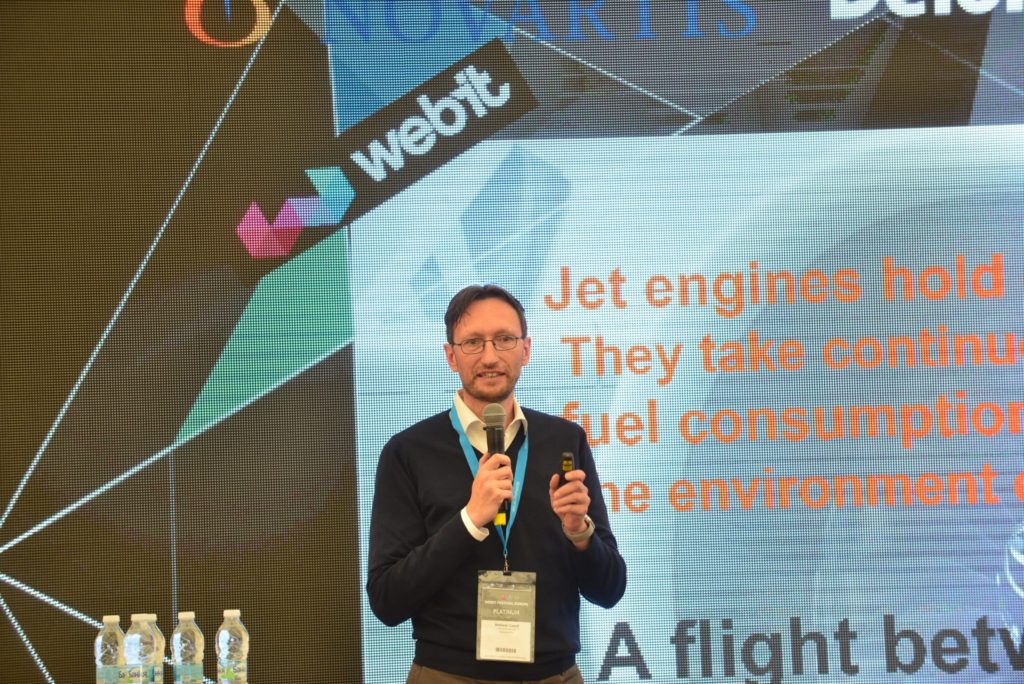 The Founder & CEO of Biovotion Dr. Andreas Caduff[/caption]
Today’s real game changer - GDPR is a regulation which protects the privacy of people’s data within the European Union. Patients have more control over their personal data and the right to ask their data to be deleted or exported so they can bring it to another vendor. Of course, the main focus is on privacy and the prevention of data leaks in case of which serious penalties exist.
Biovotion created Everion - a device which measures many parameters among which heart rate, number of steps, pulse wave analysis and many more. A well-known fact is that the longer we walk, the longer we will live. What makes Everion special is that it is a device that can be worn not only during our workout, but also prior and after it, pretty much 24 hours in a day.
After Biovotion developed the device which gathers and stores a lot of data, they launched an app. The company didn’t stop there - in fact, the next step towards secure data storage and the ability to export functionalities was the cloud. Finally, in order to create a functioning ecosystem out of this medical device, Biovotion needed a communication platform. The truth is, only when all necessary elements are present, it is possible to develop a sustainable business that creates value.
Medical wearables gather a lot of data - the health and fitness data together with the true medical data can be combined to get the most accurate results of what is happening inside our bodies.
The Founder & CEO of Biovotion Dr. Andreas Caduff[/caption]
Today’s real game changer - GDPR is a regulation which protects the privacy of people’s data within the European Union. Patients have more control over their personal data and the right to ask their data to be deleted or exported so they can bring it to another vendor. Of course, the main focus is on privacy and the prevention of data leaks in case of which serious penalties exist.
Biovotion created Everion - a device which measures many parameters among which heart rate, number of steps, pulse wave analysis and many more. A well-known fact is that the longer we walk, the longer we will live. What makes Everion special is that it is a device that can be worn not only during our workout, but also prior and after it, pretty much 24 hours in a day.
After Biovotion developed the device which gathers and stores a lot of data, they launched an app. The company didn’t stop there - in fact, the next step towards secure data storage and the ability to export functionalities was the cloud. Finally, in order to create a functioning ecosystem out of this medical device, Biovotion needed a communication platform. The truth is, only when all necessary elements are present, it is possible to develop a sustainable business that creates value.
Medical wearables gather a lot of data - the health and fitness data together with the true medical data can be combined to get the most accurate results of what is happening inside our bodies.
 The Founder & CEO of Biovotion Dr. Andreas Caduff[/caption]
Today’s real game changer - GDPR is a regulation which protects the privacy of people’s data within the European Union. Patients have more control over their personal data and the right to ask their data to be deleted or exported so they can bring it to another vendor. Of course, the main focus is on privacy and the prevention of data leaks in case of which serious penalties exist.
Biovotion created Everion - a device which measures many parameters among which heart rate, number of steps, pulse wave analysis and many more. A well-known fact is that the longer we walk, the longer we will live. What makes Everion special is that it is a device that can be worn not only during our workout, but also prior and after it, pretty much 24 hours in a day.
After Biovotion developed the device which gathers and stores a lot of data, they launched an app. The company didn’t stop there - in fact, the next step towards secure data storage and the ability to export functionalities was the cloud. Finally, in order to create a functioning ecosystem out of this medical device, Biovotion needed a communication platform. The truth is, only when all necessary elements are present, it is possible to develop a sustainable business that creates value.
Medical wearables gather a lot of data - the health and fitness data together with the true medical data can be combined to get the most accurate results of what is happening inside our bodies.
The Founder & CEO of Biovotion Dr. Andreas Caduff[/caption]
Today’s real game changer - GDPR is a regulation which protects the privacy of people’s data within the European Union. Patients have more control over their personal data and the right to ask their data to be deleted or exported so they can bring it to another vendor. Of course, the main focus is on privacy and the prevention of data leaks in case of which serious penalties exist.
Biovotion created Everion - a device which measures many parameters among which heart rate, number of steps, pulse wave analysis and many more. A well-known fact is that the longer we walk, the longer we will live. What makes Everion special is that it is a device that can be worn not only during our workout, but also prior and after it, pretty much 24 hours in a day.
After Biovotion developed the device which gathers and stores a lot of data, they launched an app. The company didn’t stop there - in fact, the next step towards secure data storage and the ability to export functionalities was the cloud. Finally, in order to create a functioning ecosystem out of this medical device, Biovotion needed a communication platform. The truth is, only when all necessary elements are present, it is possible to develop a sustainable business that creates value.
Medical wearables gather a lot of data - the health and fitness data together with the true medical data can be combined to get the most accurate results of what is happening inside our bodies.
“The biggest value that we derived today is data gathered individually.”, Caduff said.Everion’s interface enables consumers to understand very quickly what is happening and what the gathered data actually means. The device allows consumers to monitor their physiological condition continuously which means they get the full picture of how their body functions. Making this information accessible to people encourages them to take care of themselves and manage their health situation. The new era of physiological monitoring introduces hand attachments capable of monitoring the heart rate variability. These medical devices tolerate motion and are very easy to use. The goal is to benefit people by making accurate measures and communicate them with a user-friendly interface. You can watch his full lecture here: If you want to keep up with the latest trends in the world of digital economy and technology, then Webit.Festival is the right place for you. Visit our website and book 2 in 1 of our Super Earlybird tickets for Webit.Festival Europe 2018. Feel the Webit vibe with some of the best photos from this year’s event! [easingslider id="4954"]
IBM is about to make ultimate data protection a reality
IBM introduces its IBM Z mainframe which is able to encrypt huge amounts of data at all times and at every level of a network.
Mainframes refer to large computers which support thousands of applications and users simultaneously. Although networks of smaller computers and cloud computing have taken the lead in recent decades, the processing power and reliability of mainframes prolong their existence. IBM’s continuous efforts to update its mainframes secure the company’s position as a market leader.
As the world goes digital, the cyber security issue becomes one of the main concerns governments, companies and users face. According to IBM, since 2013 approximately nine billion digital data records have been corrupted by hackers. Only four percent of that data was encrypted, making it easy for cyber criminals to access personal information such as credit card numbers, usernames, passwords and social security numbers. Even encrypted data can be compromised since not all companies consider hacker-proof cryptography. In fact, the encrypted data is the valuable information worth decrypting and hackers know that.
What we need is a system able to encrypt all data at all times, making it difficult for hackers to identify the most valuable information. This is where IBM Z comes in with its great processing power which handles 12 billion encrypted transactions a day. As the Vice President of threat intelligence at IBM Security, Caleb Barlow said:
“So for any type of transaction system we can now get the safety that we’re all after, which just hasn’t really been attainable up to this point.”The ability of IBM Z to keep data encrypted all of the time unless when it is being processed, is what makes the system different. In addition, the system restricts the number of administrators who can access raw data, which means hackers will have a shorter list of targets to go after. Users get access only to the data they need without the unnecessary exposure of large amounts of data that is there but they don’t need in that moment. The company looks at the large-scale cryptographic processing as a “natural extension of the architecture”. Nevertheless, the notion that there is no such thing as perfect security, still exists. That is way, IBM developers have added a feature in which the decryption keys of the mainframe are stored. In case of a breach, the system can automatically make these keys invalid until the situation is taken back under control. As far as the adoption of IBM Z is concerned, organizations which use mainframes will be very excited about the innovation. Not to mention the economic benefits such data protection system can bring by enabling companies to comply with international data retention regulations. It is hard to predict how organizations that don’t use mainframes will react to IBM Z. The question is whether they will find the system as a relevant option for their business. Whatever the answer, it is important to understand that as Joe Clabby, an analyst at the technology assessment firm Clabby Analytics, said:
“But encrypting all data, that’s a huge step. It’s pretty exciting given what a mess the world is without it.”If you are interested in the latest trends in Cyber Security, then Webit.Festival Europe is the right place for you. During the Security & Privacy Summit, you can listen to top level speakers such as the following who have attended Webit before: the Head of Unit - Data Security & Standardisation in the European Union Agency for Network and Information Security (ENISA) Dr. Andreas Mitrakas, the Co-Founder of Distil Networks Rami Essaid and the CEO of LSEC Ulrich Seldeslachts. Here you can get more information about Webit.Festival, while here you can get all the information you need about the tickets for the event.
